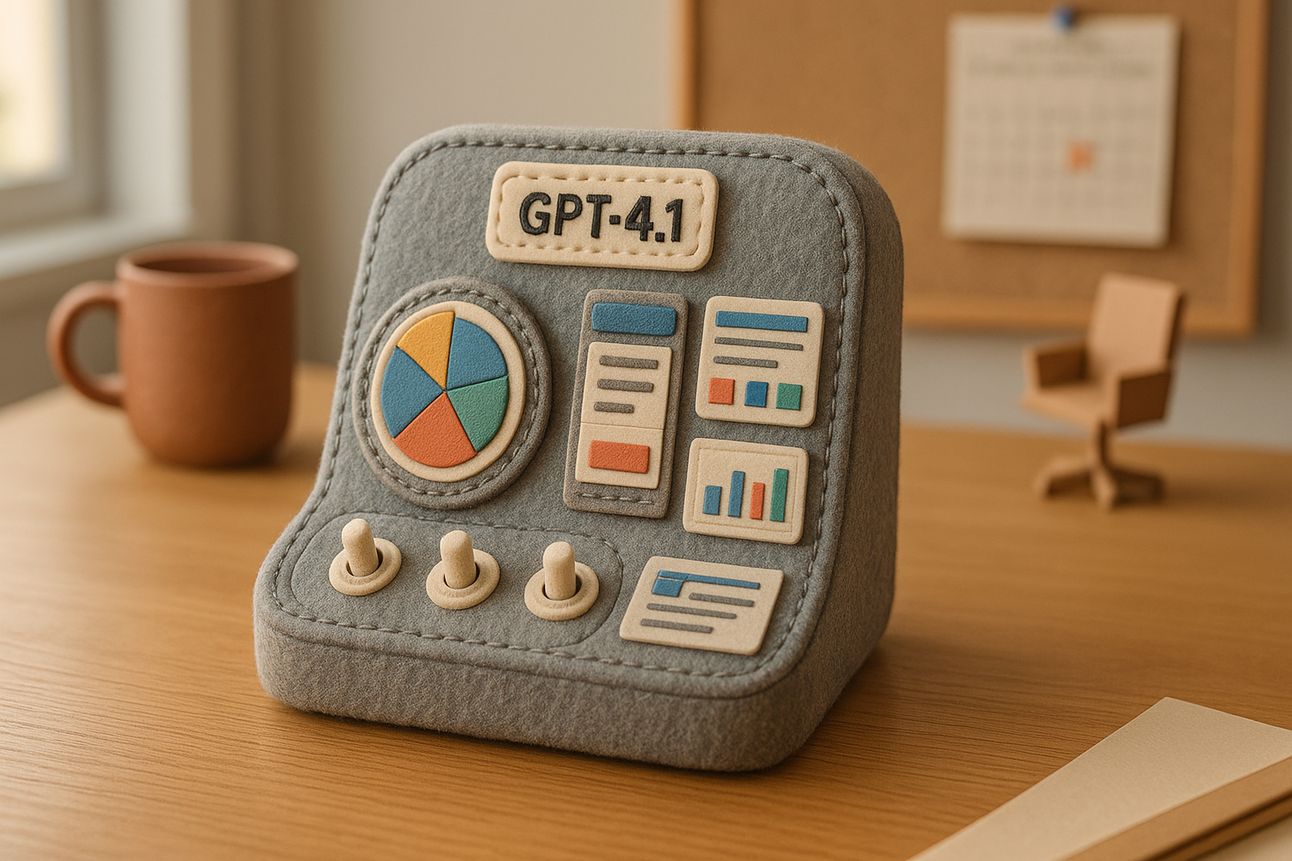- Today On AI
- Posts
- Vibe-coding startup Windsurf launches in-house AI models
Vibe-coding startup Windsurf launches in-house AI models
AND: Google rolls out new AI and accessibility features to Android and Chrome

✨TodayOnAI’s Daily Drop
Vibe-coding startup Windsurf launches in-house AI models
Google rolls out new AI and accessibility features to Android and Chrome
GPT-4.1 Launches in ChatGPT: Faster, Cheaper, Built for Deployment
💬 Let’s Fix This Prompt
🧰 Today’s AI Toolbox Pick
| 📌 The TodayOnAI Brief |
Windsurf

🚀 TodayOnAI Insight: Windsurf, known for its “vibe coding” tools, has launched its first in-house AI model family—SWE-1—marking a strategic shift from building apps to building the models behind them. This move signals deeper ambitions just as reports surface of a $3B acquisition deal with OpenAI.
🔍 Key Takeaways:
Windsurf introduced three AI models—SWE-1, SWE-1-lite, and SWE-1-mini—designed for the entire software engineering lifecycle, not just code generation.
SWE-1 competes with Claude 3.5 Sonnet, GPT-4.1, and Gemini 2.5 Pro on internal benchmarks but lags behind the latest frontier models like Claude 3.7.
SWE-1-lite and SWE-1-mini are available to all users; SWE-1 is gated behind a paid tier, though pricing remains unannounced.
The company claims SWE-1 is cheaper to serve than Claude 3.5 Sonnet and uniquely trained to handle tasks across IDEs, terminals, and web contexts.
Windsurf’s move comes as it reportedly finalizes a $3B acquisition by OpenAI, raising questions about its long-term independence.
💡 Why This Stands Out: Windsurf’s pivot from AI-powered coding tools to building proprietary models reflects a broader trend: application startups increasingly want control over their model stack. As top-tier models plateau in software engineering tasks, Windsurf is betting that domain-specific training across real developer workflows will offer a competitive edge. Will more vertical AI startups follow suit?

🚀 TodayOnAI Insight: Google is expanding AI-driven accessibility across Android and Chrome, empowering users with vision and hearing disabilities to interact more naturally with digital content. The update deepens Gemini’s integration into Android’s TalkBack and enhances real-time captioning with emotional nuance.
🔍 Key Takeaways:
TalkBack now supports interactive AI queries about on-screen images and content using Gemini, offering richer descriptions beyond static alt text.
Expressive Captions gain a duration feature, capturing the emotional tone of speech (e.g., “noooo”) and labeling nonverbal sounds like whistling or throat clearing.
Chrome on desktop introduces OCR for scanned PDFs, enabling text selection and screen reader compatibility for previously inaccessible documents.
Page Zoom in Chrome for Android lets users resize text without disrupting layout, with customizable zoom levels on a per-site or global basis.
Accessibility updates are rolling out in English across Android 15+ devices in the U.S., U.K., Canada, and Australia.
💡 Why This Stands Out: Google’s updates reflect a deeper shift toward AI as an accessibility tool—not just for automation, but for understanding and personalization. By enabling more dynamic, emotionally aware interactions, Google is making digital spaces more inclusive. As AI becomes embedded into assistive tech, what new forms of communication could emerge for users once sidelined by design?
OPENAI

🚀 TodayOnAI Insight: OpenAI has launched GPT-4.1 and GPT-4.1 mini in ChatGPT, prioritizing enterprise-grade performance, lower cost, and developer utility. Initially API-only, strong user demand prompted OpenAI to bring these models directly into the ChatGPT interface.
🔍 Key Takeaways:
Enterprise-tuned release: GPT-4.1 was designed for high instruction fidelity, reduced verbosity, and production-grade coding performance.
Wider access rollout: Now available to ChatGPT Plus, Pro, and Team users, with Enterprise and Education support coming soon.
Free-tier upgrade: GPT-4.1 mini replaces GPT-4o mini as the default model for free users—smaller but aligned with OpenAI’s safety standards.
Performance benchmarks: GPT-4.1 outperforms GPT-4o in SWE-bench (+21.4 pts) and Scale MultiChallenge (+10.5 pts); achieves 0.99 on OpenAI's refusal safety metric.
Flexible context: Offers 8K–128K token windows in ChatGPT; API version supports up to 1M tokens (not yet in ChatGPT).
💡 Why This Stands Out: GPT-4.1 marks a deliberate pivot toward operational AI. It trades size and multimodality for speed, reliability, and enterprise practicality—hallmarks increasingly valued by leaner engineering teams. OpenAI is signaling a shift from building the biggest models to building the right ones for deployment. Will this model-first, infrastructure-aware approach reshape enterprise AI adoption strategies?
| 💬 Let’s Fix This Prompt |
✨ See how a simple prompt upgrade can unlock better AI output.
🔹 The Original Prompt
"Generate blog ideas for a marketing agency."
At first glance, this prompt might seem okay. But it's too broad — and that limits the quality of AI-generated results. Let’s improve it using prompt engineering best practices.
✅ The Improved Prompt
Generate 10 blog post ideas for a digital marketing agency targeting small to mid-sized businesses. Focus on actionable insights, industry trends, and client case studies to position the agency as a thought leader and attract inbound leads.
💡 Why It's Better
Clarifies the audience (small to mid-sized businesses)
Specifies the agency type (digital marketing)
Focuses on value-driven content (insights, trends, case studies)
Aligns with strategic goals (thought leadership, lead generation)
🛠️ Learn how to adapt this prompt for SaaS, AI tools, dev teams & more →
Read the full PromptPilot breakdown
💡 Bonus Tool: Want to generate and master prompts instantly?
👉 Try PromptPilot by TodayOnAI (Free to use)
| 🧠 Smart Picks |
📰 More from the AI World
SoundCloud backtracks on AI-related terms-of-use updates
OpenAI pledges to publish AI safety test results more often
DeepMind claims its newest AI tool is a whiz at math and science problems
TensorWave raises $100M to grow its AMD-powered cloud infrastructure
🧰 Today’s AI Toolbox Pick
💡Ideas AI (Entrepreneur Tool): Handles the tax compliance burden so you can focus on more revenue with less headache.
🎓Courses AI (Academics Tool): Launches email, introductory, or signature courses to package lesson content and identify irresistible student offers.
🔐Securiti (Security Tool): Automates data access governance for sensitive data. Gain insights into who is accessing sensitive data based on geographic region and specific systems.